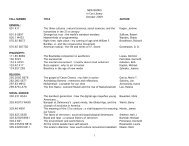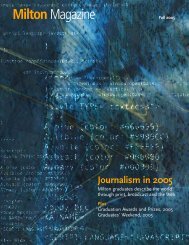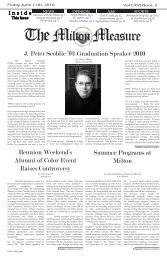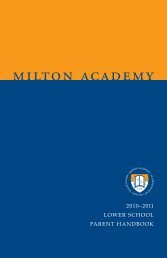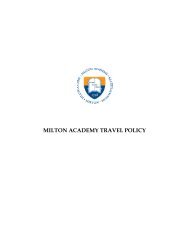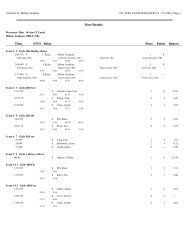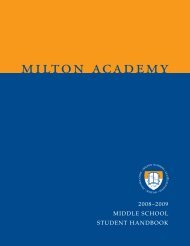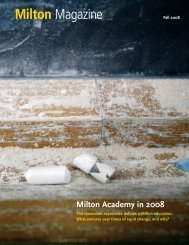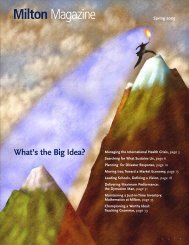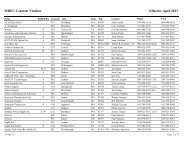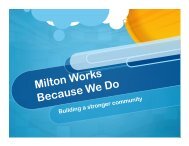Spring 2007 - Milton Academy
Spring 2007 - Milton Academy
Spring 2007 - Milton Academy
- No tags were found...
Create successful ePaper yourself
Turn your PDF publications into a flip-book with our unique Google optimized e-Paper software.
women entrepreneurs; or work with a localIndian company to produce, market anddistribute Mytry De-flouridation Filters,which give families access to clean, safedrinking water.Some ventures are disappointing, aswith those in any investment fund, andAcumen Fund is learning important lessonsand adding expertise as they go.Acumen Fund has 27 full-time staff, manywith M.B.A.s and other specialized degreeswho do the evaluation, decision-making,and bring hands-on operations expertiseto the projects Acumen backs.Uncovering sustainable solutionsOver the past six months, Owen and histeam from Monitor worked with AcumenFund to develop a strategy for the next fiveyears—one that will expand AcumenFund’s current investments from $20 millionto over $150 million. “Acumen Fund isreally at the cutting edge of a few differenttrends in the social sector, all of whichcould really change the way we think aboutcreating change in the world in the comingyears,” Owen says. “If this reallyworks, they will have uncovered a muchmore sustainable way to address issues ofglobal poverty. And so, being centrallyinvolved in helping them figure out how toactually make this work feels great.”Prior to the Acumen Fund project, muchof Owen’s work for Monitor Instituteinvolved education enterprises. He hasOwen Stearns ’89worked with an inner-city boarding schoolin Washington, D.C., that wanted to replicateits model in other cities. For the GatesFoundation, he developed a business planon behalf of a network of charter andchoice schools in Milwaukee, Wisconsin,to help the foundation evaluate and strategizepossible support. Owen’s currentproject is back in the international developmentspace—helping a publicly fundedorganization based in Latin Americadesign a transition plan, as its funding willbe eliminated and it will need to find anew business model with different sourcesof revenue.The recent evolutions within philanthropy—andapproaches to social change morebroadly—have created jobs and evencareers that did not exist even a decadeago. When Owen graduated from AmherstCollege in 1994, he had been heavilyinvolved in community service activities,including doing a City Year and supportingthe creation of AmeriCorps. He then spentseveral years with the Monitor Group, aglobal strategy consulting firm, beforeleaving to co-direct The City School, a nonprofitleadership development program forhigh school students in Boston founded by<strong>Milton</strong> <strong>Academy</strong> former faculty Todd Fry.Owen was a charter board member for theCity School and as co-director led the fundraisingstrategy, and then the search forthe next director, as well as the transitionto new leadership.With these two early experiences at leadingfor-profit and nonprofit organizations, hefound himself searching for somethingthat was a hybrid of the two. The mostinteresting learning and activity in theworld was actually in the space betweenthe two sectors, where social change wasbeing pursued without regard to the IRSdesignation. He was fortunate to findthe Foundation Strategy Group, a newlyformed firm that provides strategic adviceto private, corporate, and community foundations.After four years there, he returnedto Monitor to help launch the MonitorInstitute, its social change practice, whichworks with many of the leading actors continuingto create new approaches to longstandingproblems.Improving education for urban students isone of Owen’s core commitments: he isfounding board chair of Excel <strong>Academy</strong>, anEast Boston charter school serving middleschool students. As with Owen’s otherprojects, results matter: Students in Excel’sfirst eighth-grade graduating class outperformedstudents from nearly every districtin the state, scoring in the top 9 percentstatewide on the 2006 English MCASexam and in the top 6 percent statewide onthe 2006 math MCAS exam.Cathleen Everett5 <strong>Milton</strong> Magazine



